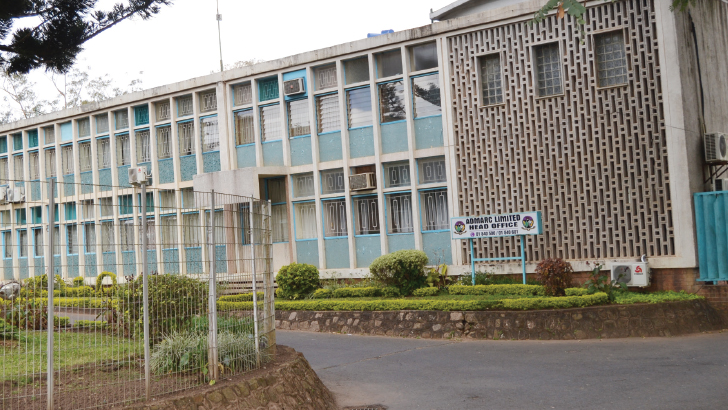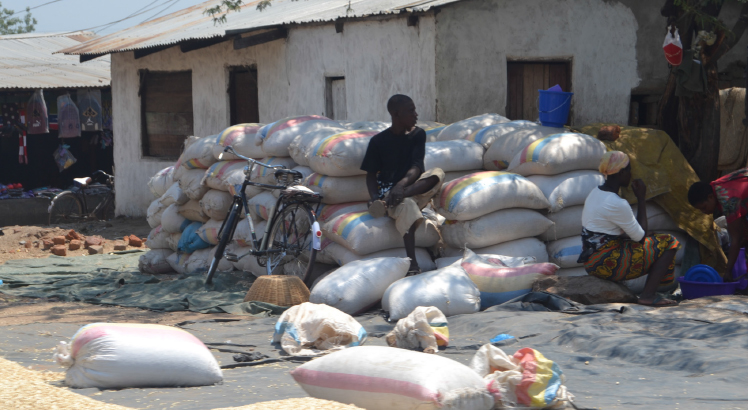In an ideal situation, State-owned enterprises or commercially-oriented parastatals are expected to make profits and pay dividends to their shareholder, in our case the Malawi Government.
But for a long time, dividend earnings from statutory corporations have remained a pipedream for the Malawi Government as a bulk of its businesses, so to say, have struggled to perform. Many of them post losses year in and year out such that they need bailouts from their shareholder to keep going.
Admarc Headquarters in Limbe, Blantyre
During a meeting with the Public Accounts Committee of Parliament in Lilongwe on January 25 2023, Comptroller of Statutory Corporations Peter Simbani did not mince words. He said utility firms are struggling to remit dividends because they are owed billions of kwacha in unpaid bills. He cited Electricity Supply Corporation of Malawi (Escom) which is owed about K40 billion by various government ministries, departments and agencies (MDAs) and the five water boards which are equally owed billions, mostly by MDAs as well.
I felt for Mr. Simbani as he lamented the poor situation the parastatals are going through in the story published in The Nation edition of January 26 2023 with the headline ‘Unpaid bills choke utilities’ operations’. He said: “My interest as Comptroller of Statutory Corporations is to have parastatals that are performing well in terms of finances. Parastatals that are able to remit dividends when they should. When you are being owed K11 billion there is no way that you can declare a dividend because that money is being held by somebody.”
It is a frustrating situation for a passionate and results-oriented professional such as Mr. Simbani to be presiding over institutions struggling to perform. What can be more heartbreaking is the fact that most of the strugglers are quasi-monopolies with negligible or no competition in their respective sectors.
The other day, Escom chief executive officer Kamkwamba Kumwenda said the power utility has been operating at a loss, which last year was cumulatively pegged at K112 billion since its monopoly was dismantled following its unbundling.
Through the Power Sector Reform Project, Escom was split into two, leading to the birth of the Electricity Generation Company (Egenco) in 2018. The reforms targeted to attract private sector participation in electricity generation. Next came Power Marketing Limited whose future is currently hanging in the balance.
Proponents of the changes argued that a monopolistic electricity utility entity as Escom was at the time not conducive to creation of an enabling environment for technology or business innovation, customer-oriented culture, power sector growth, economic efficiency as well as alignment of government’s and utility’s objectives.
In his lamentation, Kumwenda said Escom was on a deathbed as it was buying electricity from independent power producers (IPPs) at K140 per kilowatt hour (kWh) and selling the same to end-users or consumers at K104 per kWh, representing a loss of K36 per kWh.
The situation is not peculiar to Escom. Most State-owned enterprises are in a similar predicament where they do not operate as businesses, but social service providers or indeed charities to enable politicians to score cheap points.
Next is the Agricultural Development and Marketing Corporation, the State produce trader that was once a giant, but is now in the intensive care unit. This week, government fired all its staff pending restructuring.
Pricing is a tricky undertaking, but one thing experts agree is that the price customers are willing to pay for a product or service has little to do with the seller’s cost as they are influenced by the value they attach to a particular product or service.
But in our case, the pricing and business models in State-owned enterprises are influenced by political convenience or expediency and the Malawi Government Annual Economic Report will continue reporting about the poor performance of parastatals.
In Octobr 2022, Ministry of Finance and Economic Affairs published a consolidated report on parastatals which showed that overall, 46 percent of all the commercial State-owned enterprises registered losses and deficits in 2020, an increase from 23 percent in 2019.
There are professionals with the right skills in most of the parastatals, but they are let down by interference from politicians. For instance, why should the Minister of Water and Sanitation order water boards to reconnect supply to defaulting customers? How do they get revenue and expand to reach out to more people with clean water?
Doing business unusual can change the fortunes of parastatals. Turning around entities demands making difficult and, many times, unpopular decisions.
The post Why parastatals will continue to struggle first appeared on The Nation Online.
The post Why parastatals will continue to struggle appeared first on The Nation Online.
 Moni Malawi
Moni Malawi 

